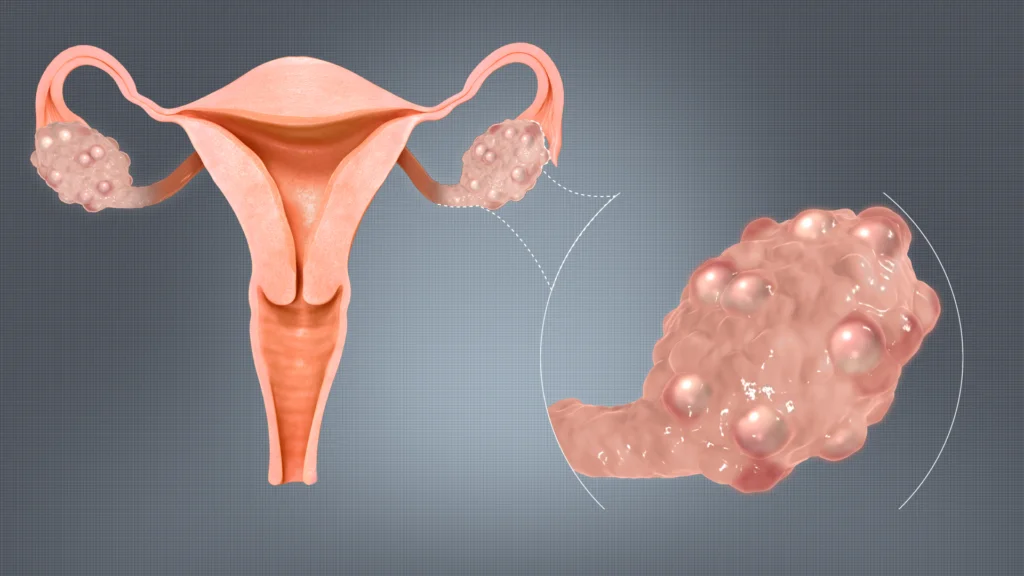Do you often skip periods or deal with stubborn acne and unexplained weight gain? It could be more than just stress — PCOS affects 1 in 5 Indian women and is one of the most searched women’s health conditions today.
If you’ve been blaming your irregular periods on work stress, diet changes, or just “bad luck,” it’s time to look deeper. PCOS (Polycystic Ovary Syndrome) is a common hormonal condition that affects millions of women worldwide, yet many remain undiagnosed for years.
The good news? PCOS is manageable, and understanding it is the first step toward taking control of your health.
What Exactly Is PCOS? (In Simple Terms)
PCOS is a hormonal disorder where your ovaries produce too many male hormones (androgens). Think of it like your body’s hormone factory having a small glitch — it’s still working, just not in perfect balance.
What Happens in Your Body:
- Your ovaries develop small cysts (fluid-filled sacs)
- Your hormone levels get mixed up
- Your periods become irregular or stop completely
- Your body struggles with insulin (the hormone that controls blood sugar)
Important: Having PCOS doesn’t mean you’re “broken” or “unhealthy” — it’s a manageable condition that affects many successful, healthy women.
Why Is PCOS So Common in Indian Women?
The Numbers Tell the Story:
- 1 in 5 Indian women have PCOS
- Urban areas see higher rates due to lifestyle factors
- Age of diagnosis is getting younger (now affecting teenagers)
Why Indian Women Are More Affected:
- Genetic predisposition: If your mother or sister has PCOS, you’re more likely to have it
- Dietary changes: Increased processed food consumption and irregular eating patterns
- Sedentary lifestyle: Less physical activity due to desk jobs and urban living
- Stress levels: High-pressure careers and family responsibilities
- Insulin resistance: Indian women are genetically more prone to diabetes and insulin issues
How PCOS Affects Your Body: The Complete Picture

Your Menstrual Cycle
What You Might Experience:
- Periods that come every 2-3 months (or even less frequently)
- Very heavy or very light periods
- Periods that last longer than 7 days
- Completely missed periods for months
Why This Happens: Hormone imbalance prevents regular ovulation, so your cycle gets disrupted.
Weight and Metabolism
Common Signs:
- Unexplained weight gain, especially around your belly
- Difficulty losing weight despite diet and exercise
- Constant food cravings, especially for sweets
- Feeling tired after meals
The Science: PCOS often comes with insulin resistance, making your body store fat more easily and making weight loss harder.
Skin and Hair Changes
What You Might Notice:
- Acne that doesn’t respond to normal treatments
- Dark patches on neck, armpits, or groin (acanthosis nigricans)
- Excessive hair growth on face, chest, or back
- Hair thinning on your head (male-pattern baldness)
Why This Happens: Extra male hormones (androgens) cause these changes.
Fertility Concerns
The Reality:
- PCOS can make getting pregnant more challenging
- It’s the leading cause of female infertility
- But here’s the important part: Most women with PCOS can still get pregnant with proper treatment
Emotional and Mental Health
Often Overlooked Signs:
- Mood swings and irritability
- Depression or anxiety
- Low self-esteem due to physical changes
- Sleep problems and fatigue
Remember: These emotional changes are real and valid — they’re part of the condition, not a character flaw.
Red Flag Signs: When to See a Doctor
See a Doctor This Month If:
- You’ve missed 3 or more periods in a row
- You have severe acne that’s not improving
- You’re gaining weight rapidly without obvious cause
- You notice excessive hair growth on face or body
- You’re having trouble getting pregnant after 6 months of trying
See a Doctor This Week If:
- You have severe pelvic pain
- Your periods are extremely heavy (changing pads/tampons every hour)
- You have severe mood changes or depression
- You’re experiencing rapid, unexplained symptoms
Questions to Ask Your Doctor:
- “Could my symptoms be related to PCOS?”
- “What tests do I need for a proper diagnosis?”
- “What treatment options work best for my situation?”
- “How will this affect my fertility plans?”
Breaking PCOS Myths: The Truth You Need

Myth 1: “PCOS Means You Can’t Have Children”
Truth: 70-80% of women with PCOS can get pregnant with proper treatment. It might take longer, but it’s definitely possible.
Myth 2: “Only Overweight Women Get PCOS”
Truth: Lean women can have PCOS too. About 20% of women with PCOS are at a normal weight.
Myth 3: “PCOS Is Just About Irregular Periods”
Truth: PCOS affects your entire body — metabolism, skin, hair, mood, and long-term health.
Myth 4: “Birth Control Pills Cure PCOS”
Truth: Pills help manage symptoms but don’t cure the condition. The symptoms return when you stop taking them.
Myth 5: “You Can’t Do Anything Natural for PCOS”
Truth: Lifestyle changes can be incredibly effective for managing PCOS symptoms.
Lifestyle Management: The Game-Changers

Diet Changes That Actually Work:
Focus on Low Glycemic Index Foods:
- Brown rice instead of white rice
- Whole wheat roti instead of refined flour
- Quinoa, oats, and millets
- Plenty of vegetables and lean proteins
Foods to Include More:
- Leafy greens (spinach, methi, palak)
- Protein-rich foods (dal, eggs, chicken, fish)
- Healthy fats (nuts, seeds, olive oil)
- Anti-inflammatory spices (turmeric, cinnamon)
Foods to Limit:
- Sugary drinks and desserts
- Processed snacks and fast food
- White bread, pasta, and refined grains
- Too much dairy (can worsen acne in some women)
Exercise That Makes a Difference:
Strength Training (2-3 times per week):
- Builds muscle, which improves insulin sensitivity
- Helps with weight management
- Can be done at home with bodyweight exercises
Cardio Exercise (150 minutes per week):
- Brisk walking, cycling, swimming
- Dancing or aerobics classes
- Even household work counts!
Yoga and Stress Management:
- Reduces stress hormones that worsen PCOS
- Improves sleep quality
- Helps with emotional well-being
Natural Supplements (Consult Your Doctor First)
Evidence-Based Options:
- Inositol: Helps with insulin resistance and fertility
- Vitamin D: Many women with PCOS are deficient
- Omega-3 fatty acids: Reduces inflammation
- Spearmint tea: May help reduce excess hair growth
Creating Your PCOS Management Routine
Daily Habits for Success
Morning Routine:
- Start with protein-rich breakfast
- Take prescribed medications consistently
- Do 10 minutes of stretching or yoga
Throughout the Day:
- Eat balanced meals every 3-4 hours
- Stay hydrated (8-10 glasses of water)
- Take short walking breaks if you have a desk job
Evening Routine:
- Exercise for 30-45 minutes
- Practice stress-reduction techniques
- Aim for 7-8 hours of sleep
Weekly Goals to Track:
- Weight and measurements
- Menstrual cycle patterns
- Energy levels and mood
- Sleep quality
- Exercise sessions completed
Long-Term Health: What to Watch For
PCOS increases your risk of:
- Type 2 diabetes
- Heart disease
- High blood pressure
- Sleep apnea
- Depression and anxiety
Prevention Strategy:
- Regular health check-ups every 6 months
- Annual diabetes screening
- Blood pressure monitoring
- Cholesterol level checks
- Mental health support when needed
Your PCOS Journey Starts Now
PCOS might feel overwhelming when you first learn about it, but remember: millions of women successfully manage this condition every day. You’re not alone, and you have more control than you think.
Key Takeaways:
- PCOS is common, manageable, and doesn’t define your worth
- Early diagnosis and treatment prevent long-term complications
- Lifestyle changes can be as effective as medication
- Most women with PCOS can achieve their health and fertility goals
- Professional support makes a huge difference
Your Next Steps:
- Track your symptoms for 2-4 weeks
- Schedule an appointment with a gynecologist
- Start implementing one or two lifestyle changes this week
- Build your support network
- Remember that managing PCOS is a journey, not a sprint
Take Control Today
Don’t let PCOS symptoms control your life. Whether you’re dealing with irregular periods, unexplained weight gain, or concerns about fertility, help is available.
The sooner you understand and address PCOS, the better your long-term health outcomes will be. You deserve to feel confident, healthy, and in control of your body.
Ready to take the first step? Book an appointment with a healthcare provider who understands PCOS, and start your journey toward better hormonal health today.





